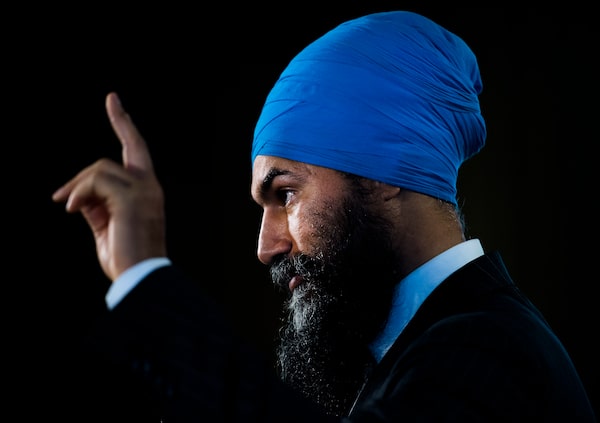
NDP Leader Jagmeet Singh told reporters on Tuesday he remains opposed to the TMX project, but would not say whether he will demand the Liberals abandon the pipeline in exchange for his party’s support in Parliament.Nathan Denette/The Canadian Press
When the votes were tallied on Monday night, Justin Trudeau’s Liberals did not pay a high price in British Columbia for the decision to buy and build the Trans Mountain pipeline expansion. Yet the pipeline – and other fossil-fuel infrastructure projects – could be derailed if it becomes a bargaining chip in a minority government.
NDP Leader Jagmeet Singh told reporters on Tuesday he remains opposed to the TMX project, but would not say whether he will demand the Liberals abandon the pipeline in exchange for his party’s support in Parliament.
Green Leader Elizabeth May, by contrast, said there is no way the Liberals will get Green support so long as the construction continues. However, with only three seats in the new Parliament, the Greens alone would be unable to impose terms on the Liberals.
“There is not a single way” the Greens will support the Liberals unless the TMX project is cancelled, Ms. May said in an interview on Monday night. “It’s not about one project, it’s about holding to the advice of the scientists to ensure the world is livable in the lifetime of our children. And you can’t add more fossil-fuel emissions.”
Ms. May said her party would also seek to oppose the LNG Canada project in British Columbia – an $18-billion liquefied natural gas terminal under construction in Kitimat, B.C. – that has been endorsed by both the federal Liberals and B.C.'s NDP government.
She said Canada cannot cut emissions enough to compensate for the additional greenhouse gas footprint of TMX and LNG Canada.
In Burnaby, Mr. Singh continued to express opposition to TMX, but said it’s too early to say what the NDP would want in exchange for supporting a Liberal minority government.
“I’m not going to negotiate the results of Parliament right now,” he said. “But what I can tell you is that I have been opposed to Trans Mountain, I will continue to be opposed to it, and I want real action on fighting the climate crisis,” he said.
Pipelines dominated talk among political leaders the day after the election. Bloc Québécois Leader Yves-François Blanchet said his party will pull out all of the stops to prevent a pipeline development in Quebec, but will not topple the Liberal minority over the expansion of the Trans Mountain pipeline and the Liberals. And the premiers of Alberta and Saskatchewan took aim at the Liberals’ track record on the oil and gas industry.
The preliminary results from Monday’s federal election reduced the Liberals to 157 seats – 13 seats short of a majority. Although the Liberals lost six of their seats in B.C., they held most of their Metro Vancouver seats, defying warnings that the decision to invest taxpayers’ money in the pipeline would hurt them at the polls on the West Coast.
In Alberta, despite the investment in getting Alberta oil to tidewater, the Liberals lost all four seats they had won in the 2015 election.
The Conservatives now have 121 seats, the Bloc Quebecois 32, the NDP 24. With only three seats, the Greens did not win official party status, and will have the same standing as Independent Jody Wilson-Raybould, the former Liberal cabinet minister, who won in her Vancouver-area riding.
The Liberal government reapproved the TMX expansion last June, after a legal challenge led by Indigenous communities on B.C.'s West Coast forced a second environmental assessment.
The crude-oil export project has pitted Alberta against the British Columbia government and oil industry supporters against environmentalists and Indigenous opponents.
As Prime Minister, Mr. Trudeau’s government bought the existing pipeline for $4.5-billion last year, to help clear the hurdles to the expansion.
Critics – including Mr. Singh and Ms. May – say the project runs counter to the Liberal government’s commitment to climate action. The Liberals have declared that the country is in a “national climate emergency” that requires deep cuts to greenhouse gas emissions to meet Canada’s international commitments.
Ms. May, speaking to reporters on Monday night, said the Liberals were “greenwashing” their climate plan during the election, and maintains the Liberal targets will not achieve the reductions in greenhouse gas emissions needed to help avoid catastrophic climate change.
“I think Canadians were prepared to believe parties that said they were going to act on climate," she said. But with the Liberals’ loss of their majority in the House of Commons, she said, she hopes Mr. Trudeau will now be willing to make changes.
“Perhaps with the Liberals in a more vulnerable position, they might be more open to … changes in our climate targets."
Our Morning Update and Evening Update newsletters are written by Globe editors, giving you a concise summary of the day’s most important headlines. Sign up today.
 Justine Hunter
Justine Hunter Janice Dickson
Janice Dickson